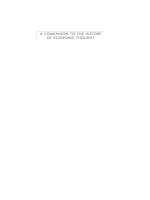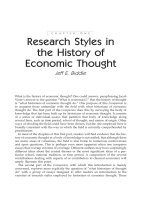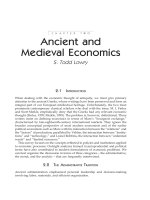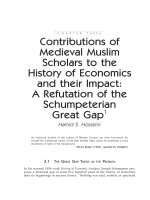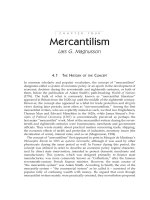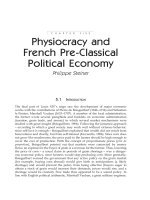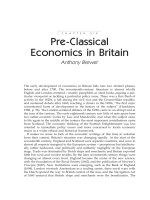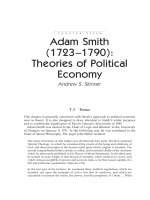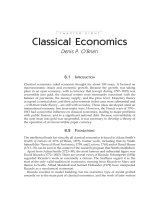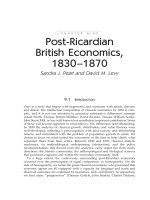Austrian perspective on the history of economic thought
Bạn đang xem bản rút gọn của tài liệu. Xem và tải ngay bản đầy đủ của tài liệu tại đây (9.89 MB, 574 trang )
Economic Thought
Before Adam Smith
Murray N. Rothbard
To my mentors,
Ludwig von Mises and Joseph Dorfman
Economic Thought
Before Adam Smith
An Austrian Perspective on the
History of Economic Thought
Volume I
Murray N. Rothbard
Lu~wig
von Mises
Institute
AUBURN, ALABAMA
The Ludwig von Mises Institute dedicates this volume to all of its
generous donors and wishes to thank these Patrons, in particular:
Anonymous
~
Reed W. Mower
~
Ramallo Pallast Wakefield & Partner;
Douglas French and Deanna Forbush; Hugh E. Ledbetter;
Mr. and Mrs. R. Nelson Nash; Jule R. Herbert, Jr.; Richard Moss
~
Andreas Acavalos; William H. Anderson;
Mr. and Mrs. William M. Benton; Richard B. Bleiberg;
John Hamilton Bolstad; Roman J. Bowser;
Mr. and Mrs. Roger H. Box; Mary E. Braum; Carl Creager;
D. Allen and Sandra Dalton; Mr. and Mrs. Jeremy S. Davis;
Mr. and Mrs. Lew Fetterman; Mr. and Mrs. Willard Fischer;
Francisco Garcia Parames; Kevin Griffin;
Dr. and Mrs. Robert Harner; Adam Hogan;
Richard J. Kossmann, M.D.; S. Giovanni Lewis; Jonathan Liem;
Bjorn Lundahl; Mr. and Mrs. William W. Massey, Jr.;
William and Zinta McDonnell; Joseph Edward Paul Melville;
Dr. Dorothy Donnelley Moller; top dog™ ; Michael Robb;
Dagny Ross; Lee Schneider; Conrad Schneiker;
Mr. and Mrs. Edward Schoppe, Jr.; Mr. and Mrs. Charles R. Sebrell;
Norman K. Singleton; John Skar; Gloria and Robert Stewart;
Joan Thompson; Willi Urbach; James S. Van Pelt; William P. Weidner;
Mr. and Mrs. Walter Woodul III; Dr. Steven Lee Yamshon
Copyright © Edward Elgar Publishing Ltd., 1995
This 2006 edition of Economic Thought Before Adam Smith: An Austrian
Perspective on the History of Economic Thought, Volume I, is published by
arrangement with Edward Elgar Publishing, Ltd.
All rights reserved. No part of this book may be reproduced in any manner whatsoever without written permission except in the case of reprints
in the context of reviews. For information write the Ludwig von Mises
Institute, 518 West Magnolia Avenue, Auburn, Alabama 36832.
ISBN: 0-945466-48-X
Contents
Introduction
Acknowledgements
1. The first philosopher-economists: the Greeks
2. The Christian Middle Ages
3. From Middle Ages to Renaissance
4. The late Spanish scholastics
5. Protestants and Catholics
6. Absolutist thought in Italy and France
7. Mercantilism: serving the absolute state
8. French mercantilist thought in the seventeenth century
9. The liberal reaction against mercantilism in seventeenth century
France
10. Mercantilism and freedom in England from the Tudors to the
Civil War
11. Mercantilism and freedom in England from the Civil War to
1750
12. The founding father of modern economics: Richard Cantillon
13. Physiocracy in mid-eighteenth century France
14. The brilliance ofTurgot
15. The Scottish Enlightenment
16. The celebrated Adam Smith
17. The spread of the Smithian movement
Bibliographical essay
Index
v
vii
xv
1
29
65
97
135
177
211
233
253
275
307
343
363
383
415
433
475
505
535
Introduction
As the subtitle declares, this work is an overall history of economic thought
from a frankly 'Austrian' standpoint: that is, from the point of view of an
adherent of the 'Austrian School' of economics. This is the only such work
by a modern Austrian; indeed, only a few monographs in specialized areas of
the history of thought have been published by Austrians in recent decades.!
Not only that: this perspective is grounded in what is currently the least
fashionable though not the least numerous variant of the Austrian School: the
'Misesian' or 'praxeologic'. 2
But the Austrian nature of this work is scarcely its only singularity. When
the present author first began studying economics in the 1940s, there was an
overwhelmingly dominant paradigm in the approach to the history of economic thought - one that is still paramount, though not as baldly as in that
era. Essentially, this paradigm features a few Great Men as the essence of the
history of economic thought, with Adam Smith as the almost superhuman
founder. But if Smith was the creator of both economic analysis and of the
free trade, free market tradition in political economy, it would be petty and
niggling to question seriously any aspect of his alleged achievement. Any
sharp criticism of Smith as either economist or free market advocate would
seem only anachronistic: looking down upon the pioneering founder from the
point of view of the superior knowledge of today, puny descendants unfairly
bashing the giants on whose shoulders we stand.
If Adam Smith created economics, much as Athena sprang full-grown and
fully armed from the brow of Zeus, then his predecessors must be foils, little
men of no account. And so short shrift was given, in these classic portrayals
of economic thought, to anyone unlucky enough to precede Smith. Generally
they were grouped into two categories and brusquely dismissed. Immediately
preceding Smith were the mercantilists, whom he strongly criticized. Mercantilists were apparently boobs who kept urging people to accumulate money
but not to spend it, or insisting that the balance of trade must 'balance' with
each country. Scholastics were dismissed even more rudely, as moralistic
medieval ignoramuses who kept warning that the 'just' price must cover a
merchant's cost of production plus a reasonable profit.
The classic works in the history of thought of the 1930s and 1940s then
proceeded to expound and largely to celebrate a few peak figures after Smith.
Ricardo systematized Smith, and dominated economics until the 1870s; then
the 'marginalists', levons, Menger and Walras, marginally corrected Smithvii
viii
Economic thought before Adam Smith
Ricardo 'classical economics' by stressing the importance of the marginal unit
as compared to whole classes of goods. Then it was on to Alfred Marshall, who
sagely integrated Ricardian cost theory with the supposedly one-sided Austrian-Jevonian emphasis on demand and utility, to create modern neoclassical
economics. Karl Marx could scarcely be ignored, and so he was treated in a
chapter as an aberrant Ricardian. And so the historian could polish off his story
by dealing with four or five Great Figures, each of whom, with the exception of
Marx, contributed more building blocks toward the unbroken progress of economic science, essentially a story of ever onward and upward into the light. 3
In the post-World War II years, Keynes of course was added to the Pantheon, providing a new culminating chapter in the progress and development
of the science. Keynes, beloved student of the great Marshall, realized that
the old man had left out what would later be called 'macroeconomics' in his
exclusive emphasis on the micro. And so Keynes added macro, concentrating
on the study and explanation of unemployment, a phenomenon which everyone before Keynes had unaccountably left out of the economic picture, or had
conveniently swept under the rug by blithely 'assuming full employment' .
Since then, the dominant paradigm has been largely sustained, although
matters have recently become rather cloudy. For one thing, this kind of Great
Man ever-upward history requires occasional new final chapters. Keynes's
General Theory, published in 1936, is now almost sixty years old; surely
there must be a Great Man for a final chapter? But who? For a while,
Schumpeter, with his modern and seemingly realistic stress on 'innovation',
had a run, but this trend came a cropper, perhaps on the realization that
Schumpeter's fundamental work (or 'vision', as he himself perceptively put
it) was written more than two decades before the General Theory. The years
since the 1950s have been murky; and it is difficult to force a return to the
once-forgotten Walras into the Procrustean bed of continual progress.
My own view of the grave deficiency of the Few Great Men approach has
been greatly influenced by the work of two splendid historians of thought.
One is my own dissertation mentor Joseph Dorfman, whose unparalleled
multi-volume work on the history of American economic thought demonstrated conclusively how important allegedly 'lesser' figures are in any movement of ideas. In the first place, the stuff of history is left out by omitting
these figures, and history is therefore falsified by selecting and worrying over
a few scattered texts to constitute The History of Thought. Second, a large
number of the supposedly secondary figures contributed a great deal to the
development of thought, in some ways more than the few peak thinkers.
Hence, important features of economic thought get omitted, and the developed theory is made paltry and barren as well as lifeless.
Furthermore, the cut-and-thrust of history itself, the context of the ideas
and movements, how people influenced each other, and how they reacted to
Introduction
ix
and against one another, is necessarily left out of the Few Great Men approach. This aspect of the historian's work was particularly brought home to
me by Quentin Skinner's notable two-volume Foundations of Modern Political Thought, the significance of which could be appreciated without adopting
Skinner's own behaviourist methodology.4
The continual progress, onward-and-upward approach was demolished for
me, and should have been for everyone, by Thomas Kuhn's famed Structure
of Scientific Revolutions. 5 Kuhn paid no attention to economics, but instead,
in the standard manner of philosophers and historians of science, focused on
such ineluctably 'hard' sciences as physics, chemistry, and astronomy. Bringing the word 'paradigm' into intellectual discourse, Kuhn demolished what I
like to call the 'Whig theory of the history of science'. The Whig theory,
subscribed to by almost all historians of science, including economics, is that
scientific thought progresses patiently, one year after another developing,
sifting, and testing theories, so that science marches onward and upward,
each year, decade or generation learning more and possessing ever more
correct scientific theories. On analogy with the Whig theory of history, coined
in mid-nineteenth century England, which maintained that things are always
getting (and therefore must get) better and better, the Whig historian of
science, seemingly on firmer grounds than the regular Whig historian, implicitly or explicitly asserts that 'later is always better' in any particular
scientific discipline. The Whig historian (whether of science or of history
proper) really maintains that, for any point of historical time, 'whatever was,
was right', or at least better than 'whatever was earlier'. The inevitable result
is a complacent and infuriating Panglossian optimism. In the historiography
of economic thought, the consequence is the firm if implicit position that
every individual economist, or at least every school of economists, contributed their important mite to the inexorable upward march. There can, then, be
no such thing as gross systemic error that deeply flawed, or even invalidated,
an entire school of economic thought, much less sent the world of economics
permanently astray.
Kuhn, however, shocked the philosophic world by demonstrating that this
is simply not the way that science has developed. Once a central paradigm is
selected, there is no testing or sifting, and tests of basic assumptions only
take place after a series of failures and anomalies in the ruling paradigm has
plunged the science into a 'crisis situation'. One need not adopt Kuhn's
nihilistic philosophic outlook, his implication that no one paradigm is or can
be better than any other, to realize that his less than starry-eyed view of
science rings true both as history and as sociology.
But if the standard romantic or Panglossian view does not work even in the
hard sciences, afortiori it must be totally off the mark in such a 'soft science'
as economics, in a discipline where there can be no laboratory testing, and
x
Economic thought before Adam Smith
where numerous even softer disciplines such as politics, religion, and ethics
necessarily impinge on one's economic outlook.
There can therefore be no presumption whatever in economics that later
thought is better than earlier, or even that all well-known economists have
contributed their sturdy mite to the developing discipline. For it becomes
very likely that, rather than everyone contributing to an ever-progressing
edifice, economics can and has proceeded in contentious, even zig-zag fashion, with later systemic fallacy sometimes elbowing aside earlier but sounder
paradigms, thereby redirecting economic thought down a total erroneous or
even tragic path. The overall path of economics may be up, or it may be
down, over any give time period.
In recent years, economics, under the dominant influence of formalism,
positivism and econometrics, and preening itself on being a hard science, has
displayed little interest in its own past. It has been intent, as in any 'real'
science, on the latest textbook or journal article rather than on exploring its
own history. After all, do contemporary physicists spend much time poring
over eighteenth century optics?
In the last decade or two, however, the reigning Walrasian-Keynesian
neoclassical formalist paradigm has been called ever more into question, and
a veritable Kuhnian 'crisis situation' has developed in various areas of economics, including worry over its methodology. Amidst this situation, the
study of the history of thought has made a significant comeback, one which
we hope and expect will expand in coming years. 6 For if knowledge buried in
paradigms lost can disappear and be forgotten over time, then studying older
economists and schools of thought need not be done merely for antiquarian
purposes or to examine how intellectual life proceeded in the past. Earlier
economists can be studied for their important contributions to forgotten and
therefore new knowledge today. Valuable truths can be learned about the
content of economics, not only from the latest journals, but from the texts of
long-deceased economic thinkers.
But these are merely methodological generalizations. The concrete realization that important economic knowledge had been lost over time came to me
from absorbing the great revision of the scholastics that developed in the
1950s and 1960s. The pioneering revision came dramatically in Schumpeter's
great History of Economic Analysis, and was developed in the works of
Raymond de Roover, Marjorie Grice-Hutchinson and John T. Noonan. It
turns out that the scholastics were not simply 'medieval', but began in the
thirteenth century and expanded and flourished through the sixteenth and into
the seventeenth century. Far from being cost-of-production moralists, the
scholastics believed that the just price was whatever price was established on
the 'common,estimate' of the free market. Not only that: far from being naive
labour or cost-of-production value theorists, the scholastics may be consid-
Introduction
xi
ered 'proto-Austrians', with a sophisticated subjective utility theory of value
and price. Furthermore, some of the scholastics were far superior to current
formalist microeconomics in developing a 'proto-Austrian' dynamic theory
of entrepreneurship. Moreover, in 'macro', the scholastics, beginning with
Buridan and culminating in the sixteenth century Spanish scholastics, worked
out an 'Austrian' rather than monetarist supply and demand theory of money
and prices, including interregional money flows, and even a purchasingpower parity theory of exchange rates.
It seems to be no accident that this dramatic revision of our knowledge of
the scholastics was brought to American economists, not generally esteemed
for their depth of knowledge of Latin, by European-trained economists steeped
in Latin, the language in which the scholastics wrote. This simple point
emphasizes another reason for loss of knowledge in the modern world: the
insularity in one's own language (particularly severe in the English-speaking
countries) that has, since the Reformation, ruptured the once Europe-wide
community of scholars. One reason why continental economic thought has
often exerted minimal, or at least delayed, influence in England and the
United States is simply because these works had not been translated into
English. 7
For me, the impact of scholastic revisionism was complemented and
strengthened by the work, during the same decades, of the German-born
'Austrian' historian, Emil Kauder. Kauder revealed that the dominant economic thought in France and Italy during the seventeenth and especially the
eighteenth centuries was also 'proto-Austrian', emphasizing subjective utility
and relative scarcity as the determinants of value. From this groundwork,
Kauder proceeded to a startling insight into the role of Adam Smith that,
however, follows directly from his own work and that of the scholastic
revisionists: that Smith, far from being the founder of economics, was virtually the reverse. On the contrary, Smith actually took the sound, and almost
fully developed, proto-Austrian subjective value tradition, and tragically
shunted economics on to a false path, a dead end from which the Austrians
had to rescue economics a century later. Instead of subjective value, entrepreneurship, and emphasis on real market pricing and market activity, Smith
dropped all this and replaced it with a labour theory of value and a dominant
focus on the unchanging long-run 'natural price' equilibrium, a world where
entrepreneurship was assumed out of existence. Under Ricardo, this unfortunate shift in focus was intensified and systematized.
If Smith was not the creator of economic theory, neither was he the founder
of laissez-faire in political economy. Not only were the scholastics analysts
of, and believers in, the free market and critics of government intervention;
but the French and Italian economists of the eighteenth century were even
more laissez-faire-oriented than Smith, who introduced numerous waffles
xii
Economic thought before Adam Smith
and qualifications into what had been, in the hands of Turgot and others, an
almost pure championing of laissez-faire. It turns out that, rather than someone who should be venerated as creator of modern economics or of laissezfaire, Smith was closer to the picture portrayed by Paul Douglas in the 1926
Chicago commemoration of the Wealth of Nations: a necessary precursor of
Karl Marx.
Emil Kauder's contribution was not limited to his portrayal of Adam Smith
as the destroyer of a previously sound tradition of economic theory, as the
founder of an enormous 'zag' in a Kuhnian picture of a zig-zag history of
economic thought. Also fascinating if more speculative was Kauder's estimate of the essential cause of a curious asymmetry in the course of economic
thought in different countries. Why is it, for example, that the subjective
utility tradition flourished on the Continent, especially in France and Italy,
and then revived particularly in Austria, whereas the labour and cost of
production theories developed especially in Great Britain? Kauder attributed
the difference to the profound influence of religion: the scholastics, and then
France, Italy and Austria were Catholic countries, and Catholicism emphasized consumption as the goal of production and consumer utility and enjoyment as, at least in moderation, valuable activities and goals. The British
tradition, on the contrary, beginning with Smith himself, was Calvinist, and
reflected the Calvinist emphasis on hard work and labour toil as not only
good but a great good in itself, whereas consumer enjoyment is at best a
necessary evil, a mere requisite to continuing labour and production.
On reading Kauder, I considered this view a challenging insight, but essentially an unproven speculation. However, as I continued studying economic
thought and embarked on writing these volumes, I concluded that Kauder
was being confirmed many times over. Even though Smith was a 'moderate'
Calvinist, he was a staunch one nevertheless, and I came to the conclusion
that the Calvinist emphasis could account, for example, for Smith's otherwise
puzzling championing of usury laws, as well as his shift in emphasis from the
capricious, luxury-loving consumer as the determinant of value, to the virtu"ous labourer embedding his hours of toil into the value of his material
product.
But if Smith could be accounted for by Calvinism, what of the SpanishPortuguese Jew-turned-Quaker, David Ricardo, surely no Calvinist? Here it
seems to me that recent research into the dominant role of James Mill as
mentor of Ricardo and major founder of the 'Ricardian system' comes strongly
into play. For Mill was a Scotsman ordained as a Presbyterian minister and
steeped in Calvinism; the fact that, later in life, Mill moved to London and
became an agnostic had no effect on the Calvinist nature of Mill's basic
attitudes toward life and the world. Mill's enormous evangelical energy, his
crusading for social betterment, and his devotion to labour toil (as well as the
Introduction
xiii
cognate Calvinist virtue of thrift) reflected his lifelong Calvinist world-outlook. John Stuart Mill's resurrection of Ricardianism may be interpreted as
his fileopietist devotion to the memory of his dominant father, and Alfred
Marshall's trivialization ofAustrian insights into his own neo-Ricardian schema
also came from a highly moralistic and evangelical neo-Calvinist.
Conversely, it is no accident that the Austrian School, the major challenge
to the Smith-Ricardo vision, arose in a country that was not only solidly
Catholic, but whose values and attitudes were still heavily influenced by
Aristotelian and Thomist thought. The German precursors of the Austrian
School flourished, not in Protestant and anti-Catholic Prussia, but in those
German states that were either Catholic or were politically allied to Austria
rather than Prussia.
The result of these researches was my growing conviction that leaving out
religious outlook, as well as social and political philosophy, would disastrously skew any picture of the history of economic thought. This is fairly
obvious for the centuries before the nineteenth, but it is true for that century
as well, even as the technical apparatus takes on more of a life of its own.
In consequence of these insights, these volumes are very different from the
norm, and not just in presenting an Austrian rather than a neoclassical or
institutionalist perspective. The entire work is much longer than most since it
insists on bringing in all the 'lesser' figures and their interactions as well as
emphasizing the importance of their religious and social philosophies as well
as their narrower strictly 'economic' views. But I would hope that the length
and inclusion of other elements does not make this work less readable. On
the contrary, history necessarily means narrative, discussion of real persons
as well as their abstract theories, and includes triumphs, tragedies, and conflicts, conflicts which are often moral as well as purely theoretical. Hence, I
hope that, for the reader, the unwonted length will be offset by the inclusion
of far more human drama than is usually offered in histories of economic
thought.
Murray N. Rothbard
Las Vegas, Nevada
Notes
1.
2.
3.
Joseph Schumpeter's valuable and monumental History (~t' Economic Analysis (New York:
Oxford University Press, 1954), has sometimes been referred to as 'Austrian'. But while
Schumpeter was raised in Austria and studied under the great Austrian Bohm-Bawerk, he
himself was a dedicated Walrasian, and his History was, in addition, eclectic and idiosyncratic.
For an explanation of the three leading Austrian paradigms at the present time, see Murray
N. Rothbard, The Present State (~t' Austrian Economics (Auburn, Ala.: Ludwig von Mises
Institute, 1992).
When the present author was preparing for his doctoral orals at Columbia University, he
xiv
Economic thought before Adam Smith
had the venerable John Maurice Clark as examiner in the history of economic thought.
When he asked Clark whether he should read Jevons, Clark replied, in some surprise:
'What's the point? The good in Jevons is all in Marshall' .
4. Joseph Dorfman, The Economic Mind in American Civilization (5 vols, New York: Viking
Press, 1946-59); Quentin Skinner, The Foundations (~t' Modern Political Thought (2 vols,
Cambridge: Cambridge University Press, 1978).
5. Thomas S. Kuhn, The Structure (~t' Scientific Revolutions (1962, 2nd ed., Chicago: University of Chicago Press, 1970).
6. The attention devoted in recent years to a brilliant critique of neoclassical formalism as
totally dependent on obsolete mid-nineteenth century mechanics is a welcome sign of this
recent change of attitude. See Philip Mirowski, More Heat than Light (Cambridge: Cambridge University Press, 1989).
7. At the present time, when English has become the European lingua franca, and most
European journals publish articles in English, this barrier has been minimized.
Acknowledgements
These volumes were directly inspired by Mark Skousen, of Rollins College,
Florida, who urged me to write a history of economic thought from an
Austrian perspective. In addition to providing the spark, Skousen persuaded
the Institute for Political Economy to support my research during its first
academic year. Mark first envisioned the work as a standard Smith-to-thepresent moderately sized book, a sort of contra-Heilbroner. After pondering
the problem, however, I told him that I would have to begin with Aristotle,
since Smith was a sharp decline from many of his predecessors. Neither of us
realized then the scope or length of the ensuing research.
It is impossible to list all the persons from whom I have learned in a
lifetime of instruction and discussion in the history of economics and all its
cognate disciplines. Here I shall have to slight most of them and single out a
few. The dedication acknowledges my immense debt to Ludwig von Mises
for providing a mighty edifice of economic theory, as well as for his teaching,
his friendship, and for the inspiring example of his life. And to Joseph
Dorfman for his path-breaking work in the history of economic thought, his
stress on the importance of the stuff of history as well as of the theories
themselves, and his painstaking instruction in historical method.
lowe a great debt to Llewellyn H. Rockwell Jr for creating and organizing
the Ludwig von Mises Institute, establishing it at Auburn University, and
building it, in merely a decade, into a flourishing and productive centre for
advancing and instructing people in Austrian economics. Not the least service to me of the Mises Institute was attracting a network of scholars from
whom I could learn. Here again I must single out Joseph T. Salerno, of Pace
University, who has done remarkably creative work in the history of economic thought; and that extraordinary polymath and scholar's scholar, David
Gordon of the Mises Institute, whose substantial output in philosophy, economics and intellectual history embodies only a small fraction of his erudition in these and many other fields. Also thanks to Gary North, head of the
Institute for Christian Economics in Tyler, Texas, for leads into the extensive
bibliography on Marx and on socialism generally, and for instructing me in
the mysteries of varieties of millennialism, a-, pre- and post. None of these
people, of course, should be implicated in any of the errors herein.
Most of my research was conducted with the aid of the superb resources of
Columbia and Stanford University libraries, as well as the library at the
University of Nevada, Las Vegas, supplemented by my own book collection
xv
xvi
Economic thought before Adam Smith
accumulated over the years. Since I am one of the few scholars remaining
who stubbornly cleave to low-tech typewriters rather than adopt word processors/computers, I have been dependent on the services of a number of
typists/word processors, among whom I would particularly mention Janet
Banker and Donna Evans of the University of Nevada, Las Vegas.
In addition the author and publishers wish to thank the following who have
kindly given permission for the use of copyright material.
Groenewegen, P.D. (ed.), The Economics of A.R.J. Turgot. Copyright 1977,
by Martinus Nijhoff, The Hague. Reprinted by permission of Kluwer Academic Publishers.
Rothkrug, Lionel, Opposition to Louis XIV. Copyright 1965, renewed 1993,
by the Princeton University Press. Reprinted by permission of Princeton
University Press. _
The author would particularly like to express his appreciation for the efficiency and graciousness of Mrs Berendina van Straalen, of the Rights and
Permission Dept, Kluwer Academic Publishers, Dordrecht, The Netherlands.
1
The first philosopher-economists: the Greeks
1.1
1.2
1.3
1.4
1.5
1.6
1.7
1.8
1.9
1.10
1.11
The natural law
The politics of the polis
The first 'economist': Hesiod and the problem of scarcity
The pre-Socratics
Plato's right-wing collectivist utopia
Xenophon on household management
Aristotle: private property and money
Aristotle: exchange and value
The collapse after Aristotle
Taoism in ancient China
Note
1
3
6
8
9
10
12
13
15
18
23
27
The first philosopher-economists: the Greeks
3
It all began, as usual, with the Greeks. The ancient Greeks were the first
civilized people to use their reason to think systematically about the world
around them. The Greeks were the first philosophers (philo sophia -lovers of
wisdom), the first people to think deeply and to figure out how to attain and
verify knowledge about the world. Other tribes and peoples had tended to
attribute natural events to arbitrary whims of the gods. A violent thunderstorm, for example, might be ascribed to something that had irritated the god
of thunder. The way to bring on rain, then, or to curb violent thunderstorms,
would be to find out what acts of man would please the god of rain or appease
the thunder god. Such people would have considered it foolish to try to figure
out the natural causes of rain or of thunder. Instead, the thing to do was to
find out what the relevant gods wanted and then try to supply their needs.
The Greeks, in contrast, were eager to use their reason - their sense
observations and their command of logic - to investigate and learn about
their world. In so doing, they gradually stopped worrying about the whims of
the gods and to investigate actual entities around them. Led in particular by
the great Athenian philosopher Aristotle (384-322 B.C.), a magnificent and
creative systematizer known to later ages as The Philosopher, the Greeks
evolved a theory and a method of reasoning and of science which later came
to be called the natural law.
1.1 The natural law
Natural law rests on the crucial insight that to be necessarily means to be
something, that is, some particular thing or entity. There is no Being in the
abstract. Everything that is, is some particular thing, whether it be a stone, a
cat, or a tree. By empirical fact there is more than one kind of thing in the
universe; in fact there are thousands, if not millions of kinds of things. Each
thing has its own particular set of properties or attributes, its own nature, which
distinguishes it from other kinds of things. A stone, a cat, an elm tree; each has
its own particular nature, which man can discover, study and identify.
Man studies the world, then, by examining entities, identifying similar
kinds of things, and classifying them into categories each with its own
properties and nature. If we see a cat walking down the street, we can
immediately include it into a set of things, or animals, called 'cats' whose
nature we have already discovered and analysed.
If we can discover and learn about the natures of entities X and Y, then we
can discover what happens when these two entities interact. Suppose, for
example, that when a certain amount of X interacts with a given amount of Y
we get a certain quantity of another thing, Z. We can then say that the effect,
Z, has been caused by the interaction of X and Y. Thus, chemists may discover that when two molecules of hydrogen interact with one molecule of
oxygen, the result is one molecule of a new entity, water. All these entities -
4
Economic thought before Adam Smith
hydrogen, oxygen and water - have specific discoverable properties or natures which can be identified.
We see, then, that the concepts of cause and effect are part and parcel of
natural law analysis. Events in the world can be traced back to the interactions of specific entities. Since natures are given and identifiable, the interactions of the various entities will be replicable under the same conditions.
The same causes will always yield the same effects.
For the Aristotelian philosophers, logic was not a separate and isolated
discipline, but an integral part of the natural law. Thus, the basic process of
identifying entities led, in 'classical' or Aristotelian logic, to the Law of
Identity: a thing is, and cannot be anything other than, what it is: a is a.
It follows, then, that an entity cannot be the negation of itself. Or, put
another way, we have the Law of Non-Contradiction: a thing cannot be both
a and non-a. a is not and cannot be non-a.
Finally, in our world of numerous kinds of entities, anything must be either
a or it won't be; in short, it will either be a or non-a. Nothing can be both.
This gives us the third well-known law of classical logic: the Law of the
Excluded Middle: everything in the universe is either a or non-a.
But if every entity in the universe - if hydrogen, oxygen, stone, or cats can be identified, classified, and its nature examined, then so too can man.
Human beings must also have a specific nature with specific properties that
can be studied, and from which we can obtain knowledge. Human beings are
unique in the universe because they can and do study themselves, as well as
the world around them, and try to figure out what goals they should pursue
and what means they can employ to achieve them.
The concept of 'good' .(and therefore of 'bad') is only relevant to living
entities. Since stones or molecules have no goals or purposes, any idea of
what might be 'good' for a molecule or stone would properly be considered
bizarre. But what might be 'good' for an elm tree or a dog makes a great deal
of sense: specifically, 'the good' is whatever conduces to the life and the
flourishing of the living entity. The 'bad' is whatever injures such an entity's
life or prosperity. Thus, it is possible to develop an 'elm tree ethics' by
discovering the best conditions: soil, sunshine, climate, etc., for the growth
and sustenance of elm trees; and by trying to avoid conditions deemed 'bad'
for elm trees: elm blight, excessive drought, etc. A similar set of ethical
properties can be worked out for various breeds of animals.
Thus, natural law sees ethics as living-entity- (or species-) relative. What
is good for cabbages will differ from what is good for rabbits, which in turn
will differ from what is good or bad for man. The ethic for each species will
differ according to their respective natures.
Man is the only species which can - and indeed must - carve out an ethic
for himself. Plants lack consciousness, and therefore cannot choose or act.
The first philosopher-economists: the Greeks
5
The consciousness of animals is narrowly perceptual and lacks the conceptual: the ability to frame concepts and to act upon them. Man, in the famous
Aristotelian phrase, is uniquely the rational animal - the species that uses
reason to adopt values and ethical principles, and that acts to attain these
ends. Man acts; that is, he adopts values and purposes, and chooses the ways
to achieve them.
Man, therefore, in seeking goals and ways to attain them, must discover
and work within the framework of the natural law: the properties of himself
and of other entities and the ways in which they may interact.
Western civilization is in many ways Greek; and the two great philosophic
traditions of ancient Greece which have been shaping the Western mind ever
since have been those of Aristotle and his great teacher and antagonist Plato
(428-347 BC). It has been said that every man, deep down, is either a
Platonist or an Aristotelian, and the divisions run throughout their thought.
Plato pioneered the natural law approach which Aristotle developed and
systematized; but the basic thrust was quite different. For Aristotle and his
followers, man's existence, like that of all other creatures, is 'contingent', i.e.
it is not necessary and eternal. Only God's existence is necessary and transcends time. The contingency of man's existence is simply an unalterable
part of the natural order, and must be accepted as such.
To the Platonists, however, especially as elaborated by Plato's follower,
the Egyptian Plotinus (204-270 AD), these inevitable limitations of man's
natural state were intolerable and must be transcended. To the Platonists, the
actual, concrete, temporal factual existence of man was too limited. Instead,
this existence (which is all that any of us has ever seen) is a fall from grace, a
fall from the original non-existent, ideal, perfect, eternal being of man, a godlike being perfect and therefore without limits. In a bizarre twist of language,
this perfect and never-existent being was held up by the Platonists as the truly
existent, the true essence of man, from which we have all been alienated or
cut off. The nature of man (and of all other entities) in the world is to be some
thing and to exist in time; but in the semantic twist of the Platonists, the truly
existent man is to be eternal, to live outside of time, and to have no limits.
Man's condition on earth is therefore supposed to be a state of degradation
and alienation, and his purpose is supposed to be to work his way back to the
'true' limitless and perfect self alleged to be his original state. Alleged, of
course, on the basis of no evidence whatever - indeed, evidence itself identifies, limits, and therefore, to the Platonic mind, corrupts.
Plato's and Plotinus's views of man's allegedly alienated state were highly
influential, as we shall see, in the writings of Karl Marx and his followers.
Another Greek philosopher, emphatically different from the Aristotelian tradition, who prefigured Hegel and Marx was the early pre-Socratic philosopher Heraclitus of Ephesus (c.535-475 BC). He was pre-Socratic in the sense
6
Economic thought before Adam Smith
of predating Plato's great teacher Socrates (470-399 BC), who wrote nothing
but has come down to. us as interpreted by Plato and by several other followers. Heraclitus, who was aptly given the title 'The Obscure' by the Greeks,
taught that sometimes opposites, a and non-a, can be identical, or, in other
words, that a can be non-a. This defiance of elemental logic can perhaps be
excused in someone like Heraclitus, who wrote before Aristotle developed
classical logic, but it is hard to be so forbearing to his later followers.
1.2 The politics of the polis
When man turns the use of his reason from the inanimate world to man
himself and to social organization, it becomes difficult for pure reason to
avoid giving way to the biases and prejudices of the political framework of
the age. This was all too true of the Greeks, including the Socratics, Plato
and Aristotle. Greek life was organized in small city-states (the polis) some
of which were able to carve out overseas empires. The largest city-state,
Athens, covered an area of only about one thousand square miles, or half
the size of modern Delaware. The key facet of Greek political life was that
the city-state was run by a tight oligarchy of privileged citizens, most of
whom were large landowners. Most of the population of the city-state were
slaves or resident foreigners, who generally performed the manual labour
and commercial enterprise respectively. The privilege of citizenship was
reserved to descendants of citizens. While Greek city-states fluctuated between outright tyrannies and democracies, at its most 'democratic' Athens,
for example, reserved the privileges of democratic rule to 7 per cent of the
population, the rest of whom were either slaves or resident aliens. (Thus, in
Athens of the fifth century BC, there were approximately 30 000 citizens
out of a total population of 400 000.)
As privileged landowners living off taxes and the product of slaves, Athenian citizens had the leisure for voting, discussion, the arts and - in the case
of the particularly intelligent - philosophizing. Although the philosopher
Socrates was himself the son of a stonemason, his political views were ultraelitist. In the year 404 BC, the despotic state of Sparta conquered Athens and
established a reign of terror known as the Rule of the Thirty Tyrants. When
the Athenians overthrew this short-lived rule a year later, the restored democracy executed the aged Socrates, largely on suspicion of sympathy with the
Spartan cause. This experience confirmed Socrates's brilliant young disciple,
Plato, the scion of a noble Athenian family, in what would now be called an
'ultra-right' devotion to aristocratic and despotic rule.
A decade later, Plato set up his Academy on the outskirts of Athens as a
think-tank not only of abstract philosophic teaching and research, but also as
a fountainhead of policy programmes for social despotism. He himself tried
three times unsuccessfully to set up despotic regimes in the city state of
The first philosopher-economists: the Greeks
7
Syracuse, while no less than nine of Plato's students succeeded in establishing themselves as tyrants over Greek city-states.
While Aristotle was politically more moderate than Plato, his aristocratic
devotion to the polis was fully as evident. Aristotle was born of an aristocratic family in the Macedonian coastal town of Stagira, and entered Plato's
Academy as a student at the age of 17, in 367 BC. There he remained until
Plato's death 20 years later, after which he left Athens and eventually returned to Macedonia, where he joined the court of King Philip and tutored
the young future world conqueror, Alexander the Great. After Alexander
ascended the throne, Aristotle returned to Athens in 335 BC and established
his own school of philosophy at the Lyceum, from which his great works
have come down to us as lecture notes written by himself or transcribed by
his students. When Alexander died in 323 BC, the Athenians felt free to vent
their anger at Macedonians and their sympathizers, and Aristotle was ousted
from the city, dying shortly thereafter.
Their aristocratic bent and their lives within the matrix of an oligarchic
polis had a greater impact on the thought of the Socratics than Plato's various
excursions into theoretical right-wing collectivist Utopias or in his students'
practical attempts at establishing tyranny. For the social status and political
bent of the Socratics coloured their ethical and political philosophies and
their economic views. Thus, for both Plato and Aristotle, 'the good' for man
was not something to be pursued by the individual, and neither was the
individual a person with rights that were not to be abridged or invaded by his
fellows. For Plato and Aristotle, 'the good' was naturally not to be pursued
by the individual but by the polis. Virtue and the good life were polis- rather
than individual-oriented. All this means that Plato's and Aristotle's thought
was statist and elitist to the core, a statism which unfortunately permeated
'classical' (Greek and Roman) philosophy as well as heavily influencing
Christian and medieval thought. Classical 'natural law' philosophy therefore
never arrived at the later elaboration, first in the Middle Ages and then in the
seventeenth and eighteenth centuries, of the 'natural rights' of the individual
which may not be invaded by man or by government.
In the more strictly economic realm, the statism of the Greeks means the
usual aristocratic exaltation of the alleged virtues of the military arts and of
agriculture, as well as a pervasive contempt for labour and for trade, and
consequently of money-making and the seeking and earning of profit. Thus
Socrates, openly despising labour as unhealthy and vulgar, quotes the king of
Persia to the effect that by far the noblest arts are agriculture and war. And
Aristotle wrote that no good citizens 'should be permitted to exercise any low
mechanical employment or traffic, as being ignoble and destructive to virtue.'
Furthermore, the Greek elevation of the polis over the individual led to
their taking a dim view of economic innovation and entrepreneurship. The
8
Economic thought before Adam Smith
entrepreneur, the dynamic innovator, is after all the locus of individual ego
and creativity, and is therefore the harbinger of often disturbing social change,
as well as economic growth. But the Greek and Socratic ethical ideal for the
individual was not an unfolding and flowering of inner possibilities, but
rather a public/political creature moulded to conform to the demands of the
polis. That kind of social ideal was designed to promote a frozen society of
politically determined status, and certainly not a society of creative and
dynamic individuals and innovators.
1.3 The first 'economist': Hesiod and the problem of scarcity
No one should be misled into thinking that the ancient Greeks were 'economists' in the modern sense. In the course of pioneering in philosophy, their
philosophizing on man and his world yielded fragments of politico-economic
or even strictly economic thoughts and insights. But there were no modernstyle treatises on economics per se. It is true that the term 'economics' is
Greek, stemming from the Greek oikonomia, but oikonomia means not economics in our sense but 'household management', and treatises on 'economics' would discuss what might be called the technology of household management - useful perhaps, but certainly not what we would regard today as
economics. There is furthermore a danger, unfortunately not avoided by
many able historians of economic thought, of eagerly reading into fragments
of ancient sages the knowledge gained by modern economics. While we
surely should not overlook any giants of the past, we must also avoid any
'presentist' seizing upon a few obscure sentences to hail alleged but nonexistent forerunners of sophisticated modern concepts.
The honour of being the first Greek economic thinker goes to the poet
Hesiod, a Boeotian who lived in the very early ancient Greece of the middle
of the eighth century Be. Hesiod lived in the small, self-sufficient agricultural community of Ascra, which he himself refers to as a 'sorry place... bad
in winter, hard in summer, never good'. He was therefore naturally attuned to
the eternal problem of scarcity, of the niggardlinesss of resources as contrasted to the sweep of man's goals and desires. Hesiod's great poem, Works
and Days, consisted of hundreds of verses designed for solo recitation with
musical accompaniment. But Hesiod was a didactic poet rather than a mere
entertainer, and he often broke out of his story line to educate his public in
traditional wisdom or in explicit rules for human conduct. Of the 828 verses
in the poem, the first 383 centred on the fundamental economic problem of
scarce resources for the pursuit of numerous and abundant human ends and
desires.
Hesiod adopts the common religious or tribal myth of the 'Golden Age', of
man's alleged initial state on earth as an Eden, a Paradise of limitless abundance. In this original Eden, of course, there was no economic problem, no
